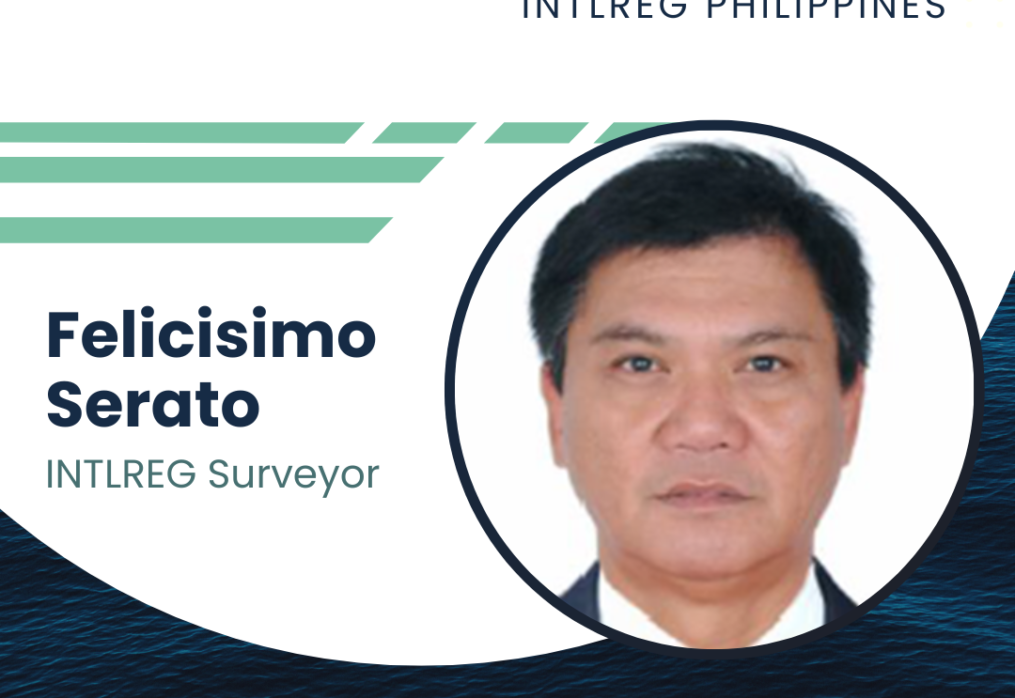Meet INTLREG People – Mr. Felicisimo Serato in Philippines
Surveyors are indeed the custodians of maritime safety and adherence to regulations. They bear the responsibility of inspecting vessels, verifying compliance with international conventions, and ensuring the vessels are fit for their intended purposes. These professionals play an indispensable role in upholding the standards of the global fleet.
Our conversation with INTLREG surveyor Mr. Felicisimo Serato have shed light on the intricacies of surveyor work, his dedication to maintaining maritime safety, and his contribution to the industry’s sustainability.
Dear Mr. Felicisimo,
Q: What is your background and experience in the maritime industry, and how long have you been working as a surveyor with INTLREG?
FS: Mechanical Engineer by profession , by offer of a client who is major shipping company in Philippines, was immersed into the marine industry.
Joined the ship management company as technical superintendent and eventually reached the position of Fleet Manager . Later was offered to join Lloyd’s Register Classification Society as Engineer/Surveyor. In 2019 Joined INTLREG as Station manager and later appointed as Survey Assurance Officer for Region 5 (SSAO) up to present.
Q: Can you explain the specific types of vessels and maritime equipment that you typically conduct surveys on?
FS: For the new ship construction ,have covered both hull and machinery surveys for various vessel types ie. LPG ships, Bulk Carrier, Oil Tanker , Container Ships, Anchor Handling Tugs (Azimuth Stern Drive), Roro -Pax Catamaran Fast Crafts, I also surveyed existing ship of following ship types – Offshore Support Vessel , Container ships ,General Cargo ships , RoRo/ Passenger ship, Yachts.
Q: What are some of the most common compliance issues or challenges you encounter during your surveys, and how do you address them?
FS: Some of compliance issues in new construction are ship builders’ omission/deviation from approved plans and drawings. Incomplete and non-compliance to ITPs ( Inspection and Test Plans), Deficiencies and quality in workmanship issues. These can be formally addressed through reference to agreed and approved quality plan, class rules and regulations, statutory requirements and acceptable alternatives with supporting technical references.
There are also instances where ship’s schedule needs to be considered in preparing and carrying out the surveys.
Q: How do you stay updated on the latest international regulations and industry best practices to ensure your surveys are in line with current standards?
FS: Staying updated is through references provided through Class and Statutory internal and external memoranda, circulars , Flag States / IMO current and latest publications , Technical Service Provider’s publications, Technical Experts Papers. Shared information with colleagues through internal correspondences. In addition to that, INTLREG is continuously providing various set of internal surveyors’ courses in order to maintain an up-to-date status with relevant regulatory updates.
Q: Can you share an example of a particularly challenging or unique survey you’ve conducted and how you successfully resolved any issues that arose?
FS: A particular auxiliary engine damage surveys where the operators ,due to lack of information, were advised and assisted on developing the correct and applicable repair procedure in accordance to existing international technical standards and class approved recommendations. The operators were able to save on expensive replacement engine ,and at the same time acquired a new engine through insurance claims (P&I).
Q: What tools or technologies do you use during your surveys, and how do these tools enhance the accuracy and efficiency of your work?
FS: The basic and most important tools that need to be used are the personal safety equipment. These ensure safe and reliable surveys on the part of surveyor, confident that he is safe to carry out the surveys and inspection. PPE and standard tools come handy during inspections, such as measuring devices ,inspection hammers, torch or flashlights ,personal gas detector, safety harness. Lately, drones are introduced to reach areas where surveyors cannot safely access , especially for enhanced survey programs/Special Surveys for large ships.
Q: How do you communicate your findings and recommendations to vessel owners or operators following a survey, and what role does transparency play in this process?
FS: Where there are findings and recommendation , informing the client/Master/Owners should be factual and straightforward without prejudice and backed up by evidence and references to rules and regulations. Transparency establishes good and lasting relationship with the client , with the impression that their property is well maintained and capable of safe voyages and delivery of cargoes.
Surveyors like Mr. Felicisimo Serato are essential in safeguarding not only the vessels but also the marine environment and the well-being of seafarers.
Their commitment to diligence and expertise is a testament to the maritime industry’s dedication to safety and compliance, ensuring that ships traverse the world’s oceans with the utmost responsibility and care.

